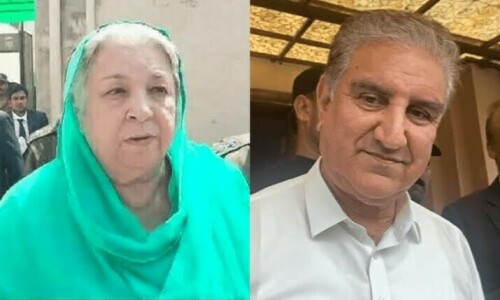A COUPLE of years ago, the PML-N suddenly announced that the Punjab government was switching to English as the medium of instruction in all public schools.
The switch was made, though the ground realities were incongruous. But a couple of months back, we heard that the government was having second thoughts and had stopped printing textbooks pending a decision on the language issue. We will know the decision soon enough as the new academic year is not too far off. The Pakistan Tehreek-i-Insaf’s (PTI) manifesto promises that English would be taught as a language from the start but Urdu or the home language/mother tongue of an area would be retained as the medium of instruction.
This is what they initially announced when they took the reins of power in Khyber Pakhtunkhwa. But recently it has been reported that they have decided to switch to English as the medium of instruction. Since they have also promised a uniform education system for the province, eventually at least, the policy will apply to all schools of the province.
How many times have we changed the medium of instruction in public schools in Pakistan? Why can we not decide the issue for the medium to long term if not for ever?
Political parties and governments keep responding to a number of important considerations. Parents want their children to learn English. They feel, quite rightly, that proficiency in English is an important factor in determining the kind of opportunities their children can have in life. This, partly at least, explains why many parents prefer sending their children to private schools that charge a fee rather than public schools that are free (leaving aside quality issues). Punjab’s switch to English was partly to address this parental concern. The PTI’s change in policy also seems to be an attempt to appease the same constituency.
At the same time educationists keep pointing out that there is plenty of evidence showing that children understand concepts better, at least in the early years, if they are taught in their home language or mother tongue. For most children in Pakistan, barring a few living in cities and going to elite schools, the language spoken at home is not English.
There is also the argument that since Urdu is our national language should we not make an effort to ensure Urdu is taught and understood across the country?
We do not have enough teachers who can teach English as a language. Those who teach social studies, mathematics or science do not have English skills. How are they going to explain concepts to their students in English? Will they be able to make the concepts intuitive enough? Will they be able to relate concepts to the lives and realities of students when they are not comfortable in the language they’ve been asked to use?
This is what empirical studies show. Teachers usually fail to explain concepts well in English so they resort to teaching in the vernacular or Urdu but then ask students to learn answers in English so they are able to take formal examinations later in the year. This is not optimal.
Is it possible to reconcile the various objectives that society seems to have? Is it possible for us to acquire proficiency in English while at the same time allow children to learn in their local language and/or Urdu?
Part of the problem lies in governments not realising (or not wanting to realise) that the medium of instruction debate is and should be distinct from the language acquisition debate. Children do not learn English if they are taught social studies, science and mathematics in English. English is learnt by learning English as a language.
If we have good language teachers, children will learn that language. And they will learn or understand science, mathematics and social studies better if they are taught these subjects in a language they know well or know the best. For most children in Pakistan their best language is not English.
This is the problem. We do not have enough good teachers to teach English as a language. The governments, instead of focusing on improving the teaching of English as a language, use the medium of instruction issue to mimic elite English-medium schools so they can appear to be addressing parental concerns about access to English. The result? Children do not learn English. They do not learn mathematics, science and social studies properly either.
The government vacillation is costly. When Punjab suddenly shifted to English as the medium of instruction, it made the life of many teachers very difficult.
They were not comfortable in the language, did not know their subject matter in English and did not know how to teach children in English. A number of headmasters said that some of their teachers were disheartened enough to request that they be shifted from teaching social studies or mathematics to Urdu or Islamiat.
Clearly, we need a saner debate and policymaking. We need to separate the issue of medium of instruction and language. We need to find better ways of teaching English. But we need to move in the direction of teaching in local languages, at least in the initial years, to ensure better conceptual development in our children.
Will the provincial governments, individually or collectively, have the courage to take on this issue?
The writer is senior adviser, Pakistan, at Open Society Foundations, associate professor of economics, LUMS, and a visiting fellow at IDEAS, Lahore.










































